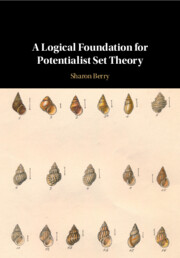Refine search
Actions for selected content:
7 results
17 - Logicism and Structuralism
- from Part III
-
- Book:
- A Logical Foundation for Potentialist Set Theory
- Published online:
- 10 February 2022
- Print publication:
- 17 February 2022, pp 183-188
-
- Chapter
- Export citation
10 - Platonism or Nominalism?
- from Part III
-
- Book:
- A Logical Foundation for Potentialist Set Theory
- Published online:
- 10 February 2022
- Print publication:
- 17 February 2022, pp 111-115
-
- Chapter
- Export citation
19 - Conclusion
- from Part III
-
- Book:
- A Logical Foundation for Potentialist Set Theory
- Published online:
- 10 February 2022
- Print publication:
- 17 February 2022, pp 202-204
-
- Chapter
- Export citation
16 - Weak Quantifier Variance, Knowledge by Stipulative Definition and Access Worries
- from Part III
-
- Book:
- A Logical Foundation for Potentialist Set Theory
- Published online:
- 10 February 2022
- Print publication:
- 17 February 2022, pp 167-182
-
- Chapter
- Export citation
15 - Weak Quantifier Variance and Mathematical Objects
- from Part III
-
- Book:
- A Logical Foundation for Potentialist Set Theory
- Published online:
- 10 February 2022
- Print publication:
- 17 February 2022, pp 155-166
-
- Chapter
- Export citation

A Logical Foundation for Potentialist Set Theory
-
- Published online:
- 10 February 2022
- Print publication:
- 17 February 2022
13 - Common Sense and Ontological Commitment
- from Part II
-
-
- Book:
- The Cambridge Companion to Common-Sense Philosophy
- Published online:
- 06 November 2020
- Print publication:
- 19 November 2020, pp 287-309
-
- Chapter
- Export citation
